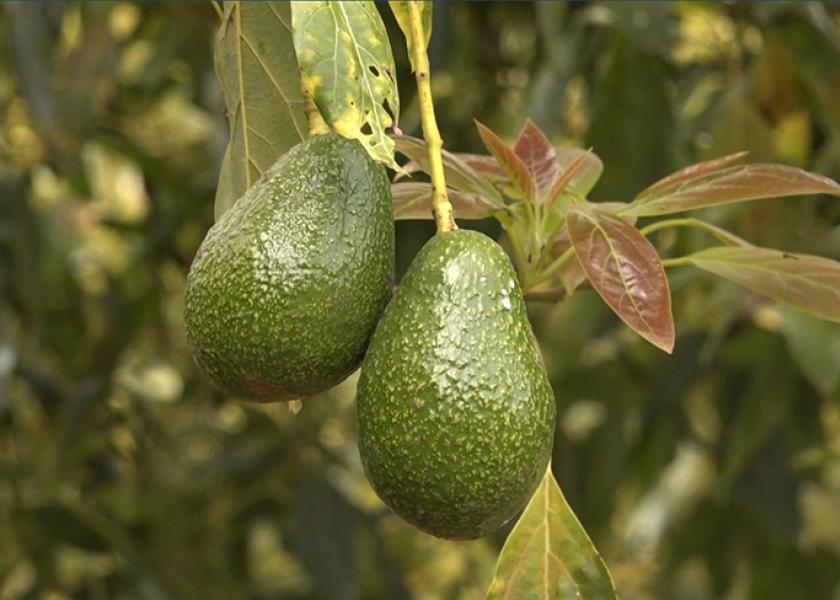Avocado Institute touts commitment to biodiversity, sustainability

In advance of Earth Day, the Avocado Institute of Mexico and its parent organizations — the Association of Avocado Exporting Producers and Packers of Mexico and Mexican Hass Avocado Importers Association — held a virtual press briefing April 17 to discuss its biodiversity efforts.
“Without a healthy planet, there cannot be a thriving avocado industry,” Ana Ambrosi, Avocados From Mexico director of corporate communications, said during the briefing. The Mexican avocado industry has aligned its sustainability strategy with the United Nations 2030 Agenda for Sustainable Development, an aspect of which is to conserve local forests and protect natural resources, Ambrosi said.
As such, one priority for the Dallas-based Avocado Institute is to protect the biodiversity in Michoacán, Mexico, the region from which most avocados exported to the U.S. hail.
“[Michoacán] is characterized by volcanic soil, a lot of rain and a very rich environment. We want to make sure that [our] avocado-producing practices and farming is responsible and environmentally friendly,” Ambrosi said.
The virtual briefing also included a look at a new video that speaks to the environmental journey of the Mexican avocado industry.
“For the Mexican avocado industry, success depends on the conservation of natural resources — soil, forests and water — which is why it is working to reduce its impact to protect the natural environment,” Ambrosi said.
To support and protect biodiversity, Ambrosi says Mexico’s avocado industry is primarily focused on three areas: promoting and protecting pollinators, preserving forests, and agricultural stewardship.
Protecting pollinators
One aspect of the Mexican avocado industry’s sustainability efforts is to protect pollinators.
“Their work is really irreplaceable,” said Ambrosi, pointing to studies that show a 25% increase in avocado production in orchards when domesticated and wild pollinators are present — mainly bees. She also said 80% of Mexican avocado production is due to pollinators.
“The Mexican avocado industry knows that to meet the increased demand in the U.S. for avocados, they have to support healthy populations of pollinators in the orchard,” Ambrosi said.
The Avocado Institute says Mexico’s avocado industry is taking a number of steps to protect and further increase the presence of pollinators, including:
- Thirty percent of avocado orchards in Michoacán have invested in on-site beehives or work with local beekeepers to intentionally increase the presence of these pollinators.
- The Mexican avocado industry is working to protect the monarch butterfly, an important native pollinator in Mexico. Through the Mexican Hass Avocado Importers Association’s partnership with Forests for Monarchs, it has planted more than 1.2 million trees in and around the biosphere and watersheds of Michoacán to protect the environment and reforest the area close to the monarch reserve.
Forest preservation
As avocados grow on trees, forest preservation is essential in the ongoing viability of the industry.
“Reforestation efforts are well on their way,” said Ambrosi, who shared that the Mexican avocado industry has a program that focuses on preserving more than 1.3 million acres of the “avocado strip,” the area in Michoacán where the avocado orchards are located.
Efforts on the strip include working to prevent and respond to fires, creating a biological corridor and developing research aimed at the sustainable use of soil and water. In addition to these programs, the Mexican avocado industry says it is committed to healthy forests through:
- Supporting various extensive reforestation programs, planting nearly 2.9 million trees and reforesting approximately 5,200 acres throughout Michoacán since 2011.
- Establishing agricultural and environmental limits to make sure new avocado harvesting areas don’t negatively impact biodiversity, in partnership with the government of Michoacán.
Responsible agricultural stewardship
Water conservation and considering the environmental impact of agrochemicals used are also initiatives.
“A little bit over 60% of the avocado orchards in Michoacán rely mostly on rainfall and natural, seasonal irrigation,” Ambrosi said. “Another 36% of avocado orchards utilize sustainable, high-tech irrigation methods, such as drip irrigation and microsprinkling. So we can claim that more than 97% of avocado orchards depend primarily on sustainable irrigation practices.”
The Mexican avocado industry says it is further minimizing its environmental footprint through initiatives like:
- Exclusively using agrochemicals that are plant- and flower-friendly and only applying them during the times of day when bees and other pollinators aren’t active.
- Relying on rainfall and natural, seasonal irrigation for approximately 61% of the avocado orchards in Michoacán, and sustainable, high-tech irrigation for another 36% of avocado orchards.
The Avocado Institute was created by the parent organizations of Avocados From Mexico, the Association of Avocado Exporting Producers and Packers of Mexico and Mexican Hass Avocado Importers Association.







